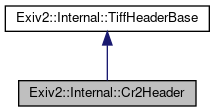 |
Exiv2
|
 |
Exiv2
|
Canon CR2 header structure. More...
#include <cr2header_int.hpp>

Public Member Functions | |
Creators | |
| Cr2Header (ByteOrder byteOrder=littleEndian) | |
| Default constructor. | |
| ~Cr2Header () | |
| Destructor. | |
Manipulators | |
| bool | read (const byte *pData, uint32_t size) |
| Read the image header from a data buffer. Return false if the data buffer does not contain an image header of the expected format, else true. More... | |
Accessors | |
| DataBuf | write () const |
| Return the image header in binary format. The caller owns this data and DataBuf ensures that it will be deleted. More... | |
| bool | isImageTag (uint16_t tag, IfdId group, const PrimaryGroups *pPrimaryGroups) const |
Return true if the Exif tag from group is an image tag. More... | |
 Public Member Functions inherited from Exiv2::Internal::TiffHeaderBase Public Member Functions inherited from Exiv2::Internal::TiffHeaderBase | |
| TiffHeaderBase (uint16_t tag, uint32_t size, ByteOrder byteOrder, uint32_t offset) | |
| Constructor taking tag, size and default byteOrder and offset. | |
| virtual | ~TiffHeaderBase ()=0 |
| Virtual destructor. | |
| virtual void | setByteOrder (ByteOrder byteOrder) |
| Set the byte order. | |
| virtual void | setOffset (uint32_t offset) |
| Set the offset to the start of the root directory. | |
| virtual void | print (std::ostream &os, const std::string &prefix="") const |
| Print debug info for the image header to os. More... | |
| virtual ByteOrder | byteOrder () const |
| Return the byte order (little or big endian). | |
| virtual uint32_t | offset () const |
| Return the offset to the start of the root directory. | |
| virtual uint32_t | size () const |
| Return the size (in bytes) of the image header. | |
| virtual uint16_t | tag () const |
| Return the tag value (magic number) which identifies the buffer as TIFF data. | |
Static Public Member Functions | |
| static uint32_t | offset2addr () |
| Return the address of offset2 from the start of the header. | |
Canon CR2 header structure.
|
virtual |
Return true if the Exif tag from group is an image tag.
Certain tags of TIFF and TIFF-like images are required to correctly display the primary image. These image tags contain image data rather than metadata.
| tag | Tag number. |
| group | Group identifier. |
| pPrimaryGroups | Pointer to a list of TIFF groups that contain primary images, empty if none are marked. |
false. Reimplemented from Exiv2::Internal::TiffHeaderBase.
References Exiv2::Internal::isTiffImageTag(), and Exiv2::Internal::TiffHeaderBase::tag().
|
virtual |
Read the image header from a data buffer. Return false if the data buffer does not contain an image header of the expected format, else true.
| pData | Pointer to the data buffer. |
| size | Number of bytes in the data buffer. |
Reimplemented from Exiv2::Internal::TiffHeaderBase.
References Exiv2::Internal::TiffHeaderBase::byteOrder(), Exiv2::getULong(), Exiv2::getUShort(), Exiv2::Internal::TiffHeaderBase::setByteOrder(), Exiv2::Internal::TiffHeaderBase::setOffset(), Exiv2::Internal::TiffHeaderBase::size(), and Exiv2::Internal::TiffHeaderBase::tag().
Referenced by Exiv2::isCr2Type(), and Exiv2::Cr2Image::writeMetadata().
|
virtual |
Return the image header in binary format. The caller owns this data and DataBuf ensures that it will be deleted.
Reimplemented from Exiv2::Internal::TiffHeaderBase.
References Exiv2::Internal::TiffHeaderBase::byteOrder(), Exiv2::DataBuf::pData_, Exiv2::Internal::TiffHeaderBase::tag(), Exiv2::ul2Data(), and Exiv2::us2Data().
 1.8.14
1.8.14